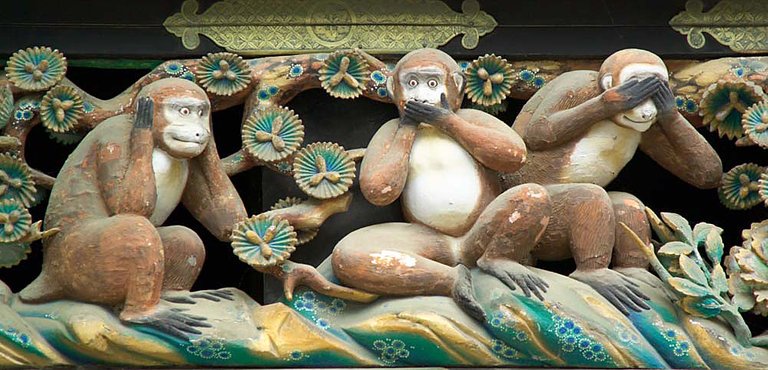Undoubtedly one of the most captivating things about the oriental culture is its richness in stories and legends so different from those of the western world. All his stories are full of unique mystery and mysticism that leave one or several life lessons to the people who read them.
The legend that I want to share with you today had its origin in China, it spread to Japan around the 8th century with the arrival of writing and is entitled "The Three Wise Monkeys" or "San Saru" (三 猿).
The most popular representation is a wooden statue found in Tokyo, in the sacred stables of the Toshogu Shrine and was built in honor of Tokugawa Ieyasu, the first shogun in history. But even today there are still references to this story, they even have their own emoji.
The three wise monkeys
This relates that the gods sent three monkeys to watch the humans and be their messengers in case they committed an evil action through the use of magic. The three monkeys had two virtues and one defect, they lacked a sense...
Kikazaru (Do not hear) was a deaf monkey, was responsible for monitoring people who committed bad acts and tell his partner Mizaru (Do not see), which was a blind monkey that took the message to the third Iwazaru monkey (Do not speak) that being mute was in charge of communicating to the gods the evil actions of humans using a spell.
It is a play on words since "saru" means "monkey" while "zaru" is used to deny something. Therefore the attributes "Kika", "Mi" and "Iwa" refer to the senses of hearing, sight and speech.
A fairly common interpretation of this legend is "Do not listen to evil, do not see evil and do not speak evil", something that was perhaps very wise at the time in which they lived, especially because of the rigid laws, but here my reflection on this ...
Is it really right to ignore bad things?
Although discretion is indispensable in some situations, it is not the same as simply ignoring the things that happen. In the world inevitably there is evil, it is a sad reality that we must face and we even see in the newspapers but the solution is not to deny that these kinds of things happen but to act against them.
If we are witnesses of the evil (either because we heard it or saw it) and we can not solve it, the correct thing is to tell someone who can help us, otherwise we would be accomplices of this. I think that with the only one of the monkeys that I agree with is Iwazaru, in the sense that we should not speak ill or hurt people with our words.
But of all the interpretations of history I think the simplest teaching is "Do not do evil ourselves", as simple as that. Remember that all the work of the monkeys begins when a person commits an evil action, if each of us avoids doing it, nothing bad happens.



I think the Western world could learn something from this. Everyone can but our culture is apt to point fingers. Sensationalize evil and profit from evil at times. (Movies and books about recent events).
Your interpretation is simple and nice. Just don't be evil, don't tolerste evil.
There are probably varying definitions of evil. Even acts of illwill or selfishness can lead to evil results.
Exactly, sometimes the simplest solution is the right one, we have to avoid doing evil in any of its forms. Thank you very much for taking the time to read it and vote me. Regards!